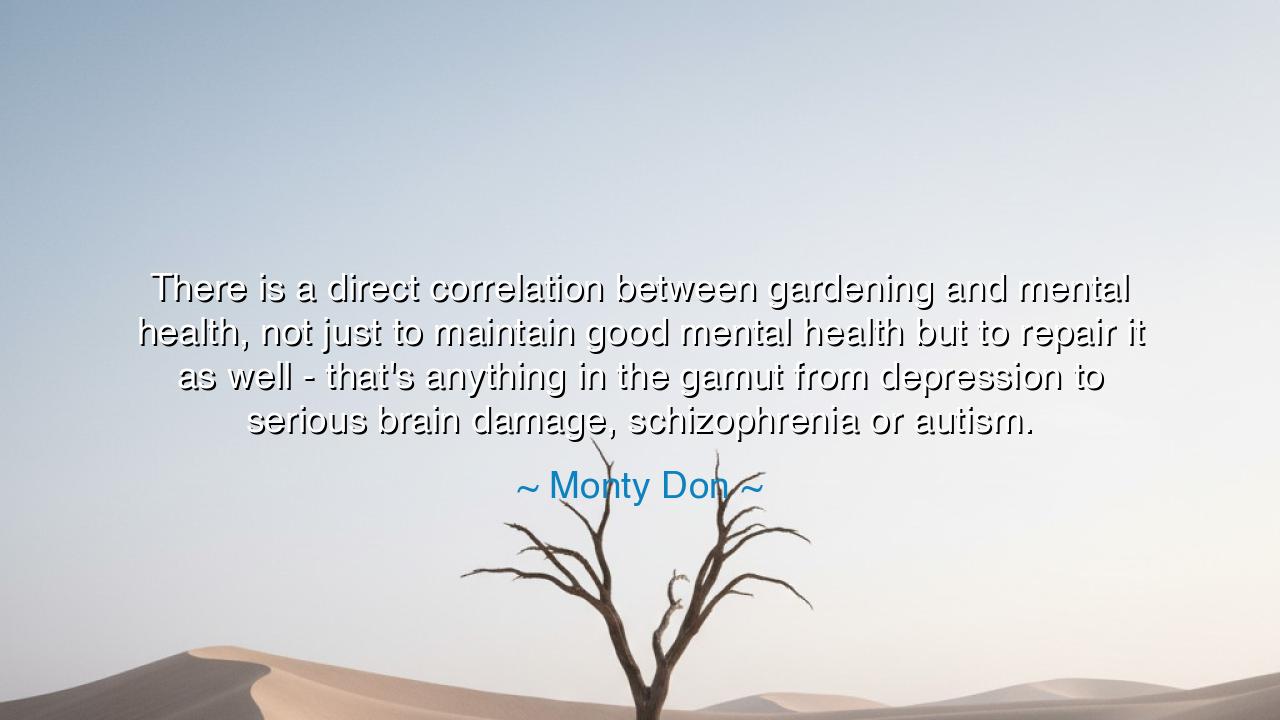
There is a direct correlation between gardening and mental
There is a direct correlation between gardening and mental health, not just to maintain good mental health but to repair it as well - that's anything in the gamut from depression to serious brain damage, schizophrenia or autism.






In the vast and ancient garden of life, there is a profound and timeless wisdom in the way that humans have always interacted with the earth. Monty Don, a modern sage of the soil, offers this truth: "There is a direct correlation between gardening and mental health, not just to maintain good mental health but to repair it as well—that's anything in the gamut from depression to serious brain damage, schizophrenia, or autism." These words resonate deeply, for they touch on an ancient understanding—that the act of gardening, of working with the earth, is not just a physical labor, but a spiritual, emotional, and mental healing practice. This connection between the earth and the human spirit has been known since the beginning of time, passed down through the generations in both sacred texts and everyday wisdom.
In the ancient world, the garden was often seen as a sacred space, a place of both nourishment and reflection. The Romans believed that the act of tending the land was a divine duty, not just for the body but for the mind and soul. The famous Roman philosopher Cicero often spoke of the importance of cultivating both the land and the spirit, understanding that working in nature brought a calm and clarity that could not be found through any other means. Even in the harshest of times, the garden provided a sanctuary for those who sought solace, a place where the earth’s rhythms could restore balance and peace.
The connection between gardening and mental health is not a new discovery. It is a recognition of the age-old wisdom that nature has the ability to heal, to restore, and to nurture in ways that the mind alone cannot. Consider the ancient Egyptians, who believed that the garden was a reflection of the divine order. They knew that the garden, with its careful cultivation, could not only sustain the body but also nourish the soul, calming the mind and renewing the spirit. The act of planting, of giving life to something from the soil, was seen as a way to reconnect with the divine and to find peace in the chaos of life. This ancient practice lives on in the words of Monty Don, who affirms the healing power of the garden for the modern mind.
In the modern age, we often find ourselves distanced from nature, from the earth beneath our feet. Yet, as Monty Don so wisely points out, gardening remains a powerful remedy for a wide range of mental health challenges. From the quiet solitude of tending plants to the rhythmic labor of weeding and planting, gardening provides a meditative space where the mind can focus on something simple, yet deeply meaningful. The act of engaging with the soil, of nurturing life, offers the mind both a distraction from its struggles and a healing connection to something greater than itself. This act of cultivation becomes a pathway to recovery, whether from the deep grief of depression or the complex challenges posed by conditions like schizophrenia or autism.
Consider the story of Dr. Benjamin Rush, a prominent physician in the 18th century who was one of the early advocates for the therapeutic use of gardens for mental health. During a time when mental illness was often treated with harsh and inhumane methods, Dr. Rush recognized that being surrounded by nature could have profound healing effects on patients. He believed that the peaceful environment of a garden could help soothe the mind, reduce stress, and promote healing in ways that traditional treatments could not. His work laid the foundation for the use of horticultural therapy in mental health treatment, showing that the garden’s power to heal was not just metaphorical, but real and tangible.
The teachings of the ancients, as well as the modern wisdom shared by Monty Don, point to the healing power of nature. Gardening provides a quiet, steady rhythm that the mind can sync with, much like the steady beat of the heart. The act of nurturing life from the soil is both an exercise in patience and a meditation on growth. For those who struggle with mental health, the garden becomes a sanctuary, a place where the mind can find rest from the relentless storms of worry and confusion. Whether it is the act of planting a single seed or tending a vast landscape, the garden teaches the lesson of gradual progress—that healing, like growth, takes time, but it is always happening beneath the surface.
Therefore, let us heed Monty Don’s wisdom and remember that the act of gardening is not just a practical task, but a profound spiritual practice. For those who struggle with the burdens of mental health, the garden offers not only a means of nourishing the body but a way to repair and restore the mind. The soil is a place of renewal, where the earth’s cycles teach us that even in our darkest moments, there is always the potential for new growth. Just as the ancient gardeners tended to the land with reverence, we, too, must approach the earth with the same respect and patience, knowing that in this sacred work, we may find the healing we seek. The garden is not just a place to plant; it is a place to transform, to heal, and to reconnect with the deepest truths of our being.






AAdministratorAdministrator
Welcome, honored guests. Please leave a comment, we will respond soon